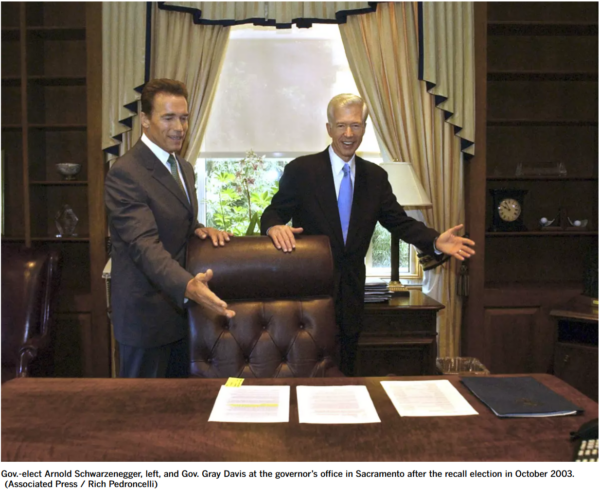Wow, it’s 20 years ago this week since Arnold Schwarzenegger became governor of California, after the recall of former Gov. Gray Davis. The recall of Gray Davis was more than just a circus – it was the epicenter of a seismic shift in American politics. Picture it: Schwarzenegger and Arianna Huffington trading barbs like political gladiators, a parade of 135 candidates, and a whirlwind 60-day campaign that left everyone breathless.
But hold on, this recall wasn’t just a spectacle; it was a harbinger of the political storms to come, foreshadowing the rise of Barack Obama in 2008 and the entrance of the one and only Donald Trump in 2016. It was a symphony of bombast and populism that set the stage for a louder, more direct era in American politics.

Schwarzenegger’s promises of increased spending on children’s programs were more than just campaign rhetoric; they laid the foundation for California’s current status as a leader in education spending. Per-pupil spending has more than doubled, health insurance now covers all children, regardless of immigration status, and the state spends more on after-school programs than the rest of the country combined – a flex so significant that the Biden administration is using it as a pitch to the other 49 states.
Then there’s the environment, another area where Schwarzenegger flexed his political muscle. He delivered on all six of his environmental promises, setting the stage for California’s continued progress in solar and alternative energy, building efficiency standards, and ambitious greenhouse gas reduction targets. The green legacy continued, with the state adding more policies and Schwarzenegger collaborating globally to combat carbon pollution.
And of course, what’s a political transformation without a touch of democracy? Schwarzenegger, nearing the end of his term, rallied voters to replace partisan primaries with a “top two” system and to eliminate gerrymandering by empowering a bipartisan commission of citizens. It wasn’t just a political makeover for California; it was a trendsetting move that has since spread to other states, giving citizens a more significant role in shaping their democracy.
As Schwarzenegger brushes off reflections on the recall, preferring to steer the conversation towards future challenges, there’s an unmistakable lesson lingering in the air – the recall taught us that anything is possible. Perhaps that’s why, when it comes to infrastructure, Schwarzenegger doesn’t settle for anything less than $1.3 trillion per year. After all, in a world where governors become action heroes and 135 candidates vie for attention, why aim for anything less?